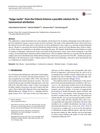1 citations,
November 2022 in “International Journal of Cosmetic Science” Lotus corniculatus seed extract reduces oily skin by decreasing sebum production.
 October 2022 in “Legume Research”
October 2022 in “Legume Research” The research found a way to grow plant tissue and analyze compounds in Bituminaria bituminosa, which is promising for hair restoration treatments.
 5 citations,
March 2017 in “Natural Product Research”
5 citations,
March 2017 in “Natural Product Research” Researchers found eight natural compounds and essential oils in the Italian plant Bituminaria basaltica, which are typical for its genus and known for bioactivity.
 February 2024 in “International Journal For Multidisciplinary Research”
February 2024 in “International Journal For Multidisciplinary Research” The herbal hair oil with natural extracts can improve hair health and reduce dandruff.
2 citations,
January 2009 A natural extract-based hair growth product was developed and showed promise in preliminary tests.
 8 citations,
January 2020 in “Skin appendage disorders”
8 citations,
January 2020 in “Skin appendage disorders” Saw palmetto supplements may modestly improve hair regrowth with few side effects, but more research is needed.
 4 citations,
September 2018 in “Rendiconti lincei. Scienze fisiche e naturali”
4 citations,
September 2018 in “Rendiconti lincei. Scienze fisiche e naturali” Researchers concluded that "spigo nardo" is the Himalayan plant Nardostachys jatamansi, used historically in medicine and cosmetics, now critically endangered.
 December 2023 in “Medicine and Materials”
December 2023 in “Medicine and Materials” Essential oils are increasingly used in cosmetics for their natural benefits but must be used carefully to avoid skin reactions.
 December 2023 in “International Journal of Advanced Research in Science, Communication and Technology”
December 2023 in “International Journal of Advanced Research in Science, Communication and Technology” Semecarpus anacardium Linn. is a plant with many health benefits, including reducing inflammation, fighting cancer, and stimulating hair growth.
 45 citations,
February 2018 in “Journal of basic and clinical physiology and pharmacology/Journal of basic & clinical physiology & pharmacology”
45 citations,
February 2018 in “Journal of basic and clinical physiology and pharmacology/Journal of basic & clinical physiology & pharmacology” *Acorus calamus* has many medicinal benefits but needs more safety research.
 November 2023 in “Deleted Journal”
November 2023 in “Deleted Journal” Cedrus libani has potential medicinal uses but needs more safety studies.
 2 citations,
September 2023 in “Frontiers in sustainable food systems”
2 citations,
September 2023 in “Frontiers in sustainable food systems” Traditional knowledge of edible oil-producing plants in Sinja Valley is declining due to outmigration and sociocultural changes.
 4 citations,
March 2022 in “Frontiers in pharmacology”
4 citations,
March 2022 in “Frontiers in pharmacology” Prunus mira Koehne is valuable for hair growth and has potential for sustainable use, but needs more research and conservation.
6 citations,
June 2021 in “EClinicalMedicine” ALRV5XR significantly improves hair density in women with hair loss and is well-tolerated.
 3 citations,
January 2015 in “Evidence-based Complementary and Alternative Medicine”
3 citations,
January 2015 in “Evidence-based Complementary and Alternative Medicine” Pumpkin seed oil may help hair growth, but more research needed on frontal hair loss and long-term effects.
 August 2023 in “International journal of basic and clinical pharmacology”
August 2023 in “International journal of basic and clinical pharmacology” Herbal hair serum promotes natural hair growth and maintains healthy hair.
 August 2023 in “International Journal of Cosmetic Science”
August 2023 in “International Journal of Cosmetic Science” Rosemary extracts, specifically compounds like rosmarinic acid and carnosic acid, can protect hair from UV damage.
 January 2024 in “Deleted Journal”
January 2024 in “Deleted Journal” Thuja plants have medicinal properties and potential for developing new therapies.
 9 citations,
January 1966 in “Economic botany”
9 citations,
January 1966 in “Economic botany” Plant-based ingredients in hair care are being replaced by synthetic alternatives.
 September 2017 in “Journal of Investigative Dermatology”
September 2017 in “Journal of Investigative Dermatology” Injections of special skin cells showed potential in treating hair loss, with some participants experiencing increased hair density.
 September 2017 in “Journal of Investigative Dermatology”
September 2017 in “Journal of Investigative Dermatology” Thermal imaging is a useful non-invasive method to diagnose active inflammation in frontal fibrosing alopecia.
 April 2024 in “International Research Journal Of Modernization In Engineering Technology And Science”
April 2024 in “International Research Journal Of Modernization In Engineering Technology And Science” Herbal shampoos are effective, non-toxic alternatives for treating dandruff and hair fall.
December 2020 in “ID on line. Revista de psicologia” Low-power laser therapy with essential oils effectively promotes new hair growth in male pattern baldness.
 14 citations,
January 2017 in “Elsevier eBooks”
14 citations,
January 2017 in “Elsevier eBooks” CBG may help with various medical conditions but needs more human research to confirm safety and effectiveness.
 January 2023 in “Food and nutrition sciences”
January 2023 in “Food and nutrition sciences” Most people using the supplement Renew saw health improvements, especially in sleep and energy, faster than with regular vitamins.
 August 2023 in “Processes”
August 2023 in “Processes” Fermenting Dendrobium officinale with Lactobacillus reuteri CCFM8631 increases its skin care benefits.
 January 2024 in “International journal of pharmaceutical sciences review and research”
January 2024 in “International journal of pharmaceutical sciences review and research” Indian jujube has many medicinal properties and can help treat ailments like diabetes, inflammation, and cancer.
 16 citations,
September 2015 in “Journal of Ethnopharmacology”
16 citations,
September 2015 in “Journal of Ethnopharmacology” The document concludes that "Dictamnus" has a rich cultural history and potential as a herbal medicine, warranting more research into its effects and safety.
 January 2023 in “Health science reports”
January 2023 in “Health science reports” French maritime pine bark extract significantly increased hair density in menopausal women.
 1 citations,
August 2023 in “International journal of pharmacy & integrated health sciences”
1 citations,
August 2023 in “International journal of pharmacy & integrated health sciences” Cosmeceuticals are popular for their skin health benefits and anti-aging effects.

























